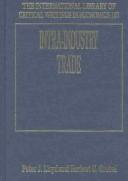| Listing 1 - 4 of 4 |
Sort by
|
Book
Year: 2017 Publisher: Washington, D.C. : The World Bank,
Abstract | Keywords | Export | Availability | Bookmark
 Loading...
Loading...Choose an application
- Reference Manager
- EndNote
- RefWorks (Direct export to RefWorks)
This paper shows new empirical regularities indicating that the structure of trade connections affects the trade-growth nexus. System generalized method of moments estimations indicate that key structural features associated with the composition of traded products and partners matter for growth. The results show that increases in the degree of intra-industry trade, greater insertion into the middle of global value chains, and increases in the shares of differentiated goods, skilled labor-intensive goods, and high-tech-intensive goods in traded baskets are all associated with higher income growth. An increase in the share of trade with countries at the core of the global trade network is also associated with greater growth effects. However, many of these effects are non-linear and depend on the degree of trade openness and labor force education. The results suggest that technological diffusion and learning spillovers play some role in the growth effects associated with the nature of trade connections.
Economic Growth --- International Trade --- Intra-Industry Trade --- Labor Skills --- Openness

ISBN: 1840649437 9781840649437 Year: 2003 Volume: 160 Publisher: Cheltenham: Elgar,
Abstract | Keywords | Export | Availability | Bookmark
 Loading...
Loading...Choose an application
- Reference Manager
- EndNote
- RefWorks (Direct export to RefWorks)
Intra-industry trade --- Econometric models --- -382 --- Intra-industry international trade --- Trade overlap --- Two-way trade --- Commerce --- Intra-industry trade - Econometric models
Book
ISBN: 080479720X 9780804797207 9780804791335 0804791333 Year: 2020 Publisher: Stanford, CA : Stanford University Press,
Abstract | Keywords | Export | Availability | Bookmark
 Loading...
Loading...Choose an application
- Reference Manager
- EndNote
- RefWorks (Direct export to RefWorks)
Intra-Industry Trade calls for us to rethink what trade most often looks like and how it shapes global institutions, fostering peace among states. Cameron G. Thies and Timothy M. Peterson argue that our understanding of trade has not kept pace with its changing nature in the 21st century; existing models, rooted in Ricardo's theories, regard trade uniformly as taking place between entities and countries that offer different commodities and operate according to the logic of comparative advantage. Though this type of exchange does take place, intra-industry trade—international trade of the same or similar commodities, in which foreign and domestic brands compete—is increasingly prevalent. The authors argue that our current academic and policymaking focus on the total volume of trade, rather than its composition, is misplaced. Trade composition matters, not just because it gives us a fuller understanding of how trade works, but also because intra-industry trade increases the likelihood of positive institutional relations and cooperation between states. To illustrate their point, the authors examine the effects that intra-industry trade has on Preferential Trade Agreement formation, its tendency to lessen World Trade Organization disputes and militarized conflict, and its ability to pave the way for new and fortified alliances.
Intra-industry trade. --- International trade. --- International economic relations. --- International relations --- Coexistence --- Foreign affairs --- Foreign policy --- Foreign relations --- Global governance --- Interdependence of nations --- International affairs --- Peaceful coexistence --- World order --- National security --- Sovereignty --- World politics --- Economic policy, Foreign --- Economic relations, Foreign --- Economics, International --- Foreign economic policy --- Foreign economic relations --- International economic policy --- International economics --- New international economic order --- Economic policy --- Economic sanctions --- External trade --- Foreign commerce --- Foreign trade --- Global commerce --- Global trade --- Trade, International --- World trade --- Commerce --- International economic relations --- Non-traded goods --- Intra-industry international trade --- Trade overlap --- Two-way trade --- Economic aspects. --- Intra-industry trade --- International trade --- Economic aspects --- E-books
Book
ISBN: 0333176243 9780333176245 Year: 1975 Publisher: London: MacMillan,
Abstract | Keywords | Export | Availability | Bookmark
 Loading...
Loading...Choose an application
- Reference Manager
- EndNote
- RefWorks (Direct export to RefWorks)
Industrial economics --- Trade theory --- Foreign trade. International trade --- Commerce --- Commercial policy --- Politique commerciale --- Mathematical models --- Modèles mathématiques --- Intra-industry trade --- International trade --- 658.11 --- AA / International- internationaal --- 382.10 --- -External trade --- Foreign commerce --- Foreign trade --- Global commerce --- Global trade --- Trade, International --- World trade --- International economic relations --- Non-traded goods --- Foreign trade policy --- International trade policy --- Trade policy --- Economic policy --- Kinds and forms of enterprise --- Theorieën van internationale en interregionale handel: algemeenheden. Comparatieve voordelen. --- Government policy --- Commercial policy. --- International trade. --- Mathematical models. --- Business mathematics --- Economics, Mathematical --- Mathématiques financières --- Mathématiques économiques --- -Kinds and forms of enterprise --- 658.11 Kinds and forms of enterprise --- Mathématiques financières --- Mathématiques économiques --- Modèles mathématiques --- External trade --- Theorieën van internationale en interregionale handel: algemeenheden. Comparatieve voordelen --- International trade - Mathematical models
| Listing 1 - 4 of 4 |
Sort by
|

 Search
Search Feedback
Feedback About UniCat
About UniCat  Help
Help News
News